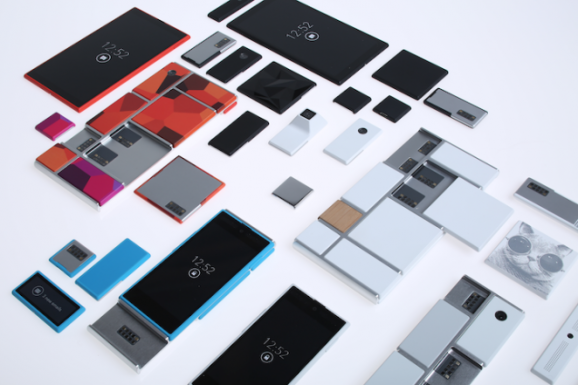DARPA And Google Developing A Modular Military Smartphone
This article is more than 2 years old
 Given how susceptible smartphones are to hacking, if the military switches from radio to those devices, it will need to take measures to become more secure, among other things, and load them with apps and utilities that soldiers can use on the battlefield. The Institute for Software Integration Systems (ISIS—not to be confused with the other ISIS you’ve been reading about on the news these days) is working on just that as part of DARPA’s Transformative Apps program, which seeks to “develop a diverse array of militarily-relevant software applications using an innovative new development and acquisition process.” The problem is that TransApp funding is about to run out, which means DARPA and ISIS are looking for other projects that might help them fulfill the military’s app needs. Right now, the frontrunner seems to be Google’s (formerly Motorola’s) Project Ara.
Given how susceptible smartphones are to hacking, if the military switches from radio to those devices, it will need to take measures to become more secure, among other things, and load them with apps and utilities that soldiers can use on the battlefield. The Institute for Software Integration Systems (ISIS—not to be confused with the other ISIS you’ve been reading about on the news these days) is working on just that as part of DARPA’s Transformative Apps program, which seeks to “develop a diverse array of militarily-relevant software applications using an innovative new development and acquisition process.” The problem is that TransApp funding is about to run out, which means DARPA and ISIS are looking for other projects that might help them fulfill the military’s app needs. Right now, the frontrunner seems to be Google’s (formerly Motorola’s) Project Ara.
The concept behind Project Ara is that of a modular smartphone with an open hardware platform that will cost somewhere around $50. It began with Motorola’s ATAP (Advanced Technologies and Products) program, which Google retained after it sold the company. At the helm of ATAP is a former DARPA director, who has helped with the cohesion between ATAP, ISIS, and DARPA to create a modular phone that can be assembled and changed on the fly as determined by the military’s needs.
Instead of being tethered to a radio, the specialized phone would allow for on-the-go memory upgrades, battery boosts, chemical sensors, specialized screens, and other technologies. Right now, the military is toying with customization using smartphones currently on the market, but those require external hardware and make it impossible to actually take existing pieces out. Project Ara wants to change all that, making all hardware swappable.
 Building such a phone is a challenge, largely because of security requirements. A soldier would need some way to communicate with headquarters or other troops, so the phone would have to connect to the radio system without being vulnerable to hackers via Wi-Fi or Bluetooth—we’re talking Blackphone to the tenth power. But Project Ara’s developers are undaunted. They’re hosting a prize challenge for new phone modules through October 1, and have their sights set on a 2015 limited release of a first version of the phone.
Building such a phone is a challenge, largely because of security requirements. A soldier would need some way to communicate with headquarters or other troops, so the phone would have to connect to the radio system without being vulnerable to hackers via Wi-Fi or Bluetooth—we’re talking Blackphone to the tenth power. But Project Ara’s developers are undaunted. They’re hosting a prize challenge for new phone modules through October 1, and have their sights set on a 2015 limited release of a first version of the phone.












